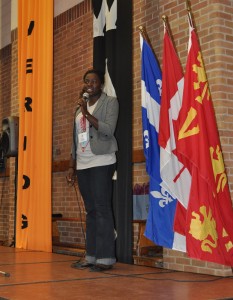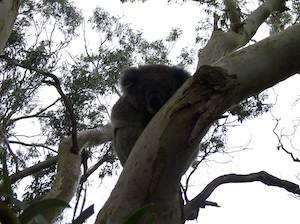 A surreal mood had set into the Velan Gym during assembly last Tuesday. Not a voice could be heard, not a single chair was squeaking and no feet were being shuffled. Only the constant breathing of 700 mesmerized students was heard. It was visible that the entire audience was stunned from the presentation by the organization featured in assembly, Invisible Children. From the very first minute of the presentation all the way till the very last second, a state of reflection seemed to have fallen over every student and staff member. The gruesome images, heartbreaking stories, and shocking facts about the war and child soldier abuse in Central Africa left the entire Lower Canada College community speechless but inspired. Though most of us sat there shocked throughout the entire 60 minutes, we were inspired to take a stand and help fight the cause. A Frontline Campaign was created within the LCC community to make a change and use the power we have to support others in need. —Yvonne Hercun ’12
A surreal mood had set into the Velan Gym during assembly last Tuesday. Not a voice could be heard, not a single chair was squeaking and no feet were being shuffled. Only the constant breathing of 700 mesmerized students was heard. It was visible that the entire audience was stunned from the presentation by the organization featured in assembly, Invisible Children. From the very first minute of the presentation all the way till the very last second, a state of reflection seemed to have fallen over every student and staff member. The gruesome images, heartbreaking stories, and shocking facts about the war and child soldier abuse in Central Africa left the entire Lower Canada College community speechless but inspired. Though most of us sat there shocked throughout the entire 60 minutes, we were inspired to take a stand and help fight the cause. A Frontline Campaign was created within the LCC community to make a change and use the power we have to support others in need. —Yvonne Hercun ’12
Tag Archives: lcc
Australian Exchange – Exploring Australia During Spring Break
 As of now, I’m half way through my exchange to Australia, and I’m also half way through my Australian spring break! I’ve learned that an Australian spring is just like a Canadian fall! The weather is fairly cold most of the time, it rains daily, but the sun still shines bright! I’ve been able to make the best of this spring, and the break has given me a perfect opportunity to explore Australia.
As of now, I’m half way through my exchange to Australia, and I’m also half way through my Australian spring break! I’ve learned that an Australian spring is just like a Canadian fall! The weather is fairly cold most of the time, it rains daily, but the sun still shines bright! I’ve been able to make the best of this spring, and the break has given me a perfect opportunity to explore Australia.
Last weekend, I went to a wildlife sanctuary where I saw everything from birds to kangaroos, which was great! I tried holding a snake but we were just a minute too late for the reptile show.
The first thing I did during the break was go to the Royal Melbourne Show. There, I was able to see Melbourne for the first time, and also go to the biggest show of the year! The rides were fun, and I got to eat some very different Australian food, plus there were sheep walking around for people to pet.
Yesterday, I came back from an overnight trip to Apollo Bay where I went zip-lining through a rain forest. On our way back, we drove on a beautiful road filled with wild koalas. The koalas were all hidden in trees, but the family of my exchange student were great at spotting them! I even got close enough to almost touch a koala, but he started getting angry making loud noises when I got too close. I still took great photos of mother koalas with babies, close-ups, and koalas alone in trees trying to protect themselves from the wind and rain. We also drove along a scenic coastal road which gave me a view of the mountains and the ocean.
Finally, in my last week of my spring break, I’m going camping up north of where I’ve been living. I’m also going to hopefully get a beach day when spring turns into summer.
Half way through my exchange, I’m extremely excited to see the other half of what Australia has to show for me. I’ve gotten used to the life here, and I feel like I live here, after only 3 weeks! Australia is exotic yet similar to Canada, and I love it! —Jeff Morris ’13
Schools on Board: Phytoplankton and the Arctic Ecosystem
October 1, 2011
Today, we learned about phytoplankton, which is important because it is responsible for most of the primary production in the Arctic ecosystem. Scientists want to know if the Arctic Ocean will be emitting or absorbing CO2 in the future due to climate change.
It’s starting to feel like we will be leaving the ship really soon. We started discussing a farewell presentation for the scientists and crew. The helicopter pilot also started giving safety briefings to prepare us for getting off the ship.
Even though we are leaving soon, we are still doing exciting activities. The chief engineer gave us a tour of the engine room this afternoon. It was very loud and smelled like diesel, but it was cool to see the inner workings of the ship. What I found interesting was the fact that the heat from the engines is used to boil seawater in order to obtain freshwater for the ship. —Karen Butt ’12
Schools on Board: Physical Oceanography
September 30, 2011
This morning, we had a presentation on physical oceanography, which includes the study of waves and currents. We learned about how water circulates between the Atlantic, Pacific, and Arctic oceans, and how climate change can drastically change this. I like physics, and it was interesting to see how it can be applied to climate change.
The scientist then showed us the Rosette, a piece of equipment that samples ocean water at different depths. He showed us the probes it has to measure temperature, salinity, pH and fluorescence. They lower it into the water with a winch that has 3km of cable. It is the most important tool on board in terms of the ship’s scientific operations, because all the scientists need to know characteristics of the ocean water from which they are sampling.
Later on, I looked at a variety of zooplankton under the microscope. I admire the patience that the scientists have, closely examining each creature and trying to determine what species it is.
We also listened to a presentation about microbes in the ocean. They do not know much about what is found in the ocean because most of the bacteria they find cannot be cultured. I love finding out about everything that there is still left to discover. —Karen Butt’12
Schools on Board: Benthic Ecology
September 29, 2011
This morning, we had two scientists talk to us about benthic ecology. This deals with organisms living on the seafloor. They are good indicators of the global state of the environment, but the scientists don’t know much yet.
I went up on deck today to watch the Boxcore go to the bottom of the ocean. This is an instrument that brings up a cube of ocean floor sediments for analysis. The scientists took the top layer to their lab, and we had to shovel the rest of the mud out of the box back into the ocean. I like how the crew lets us get involved with these kinds of operations and we feel involved in life on the ship as opposed to only watching what is happening.
Afterwards, I went to the lab with two others to sort the organisms found in the mud from the Boxcore. My mind was blown when we showed the scientist some strange creatures we found and she didn’t know what they were. I thought scientists knew so much, but there are still so many species on the bottom of the ocean that are undiscovered.
Karen Butt ’12
